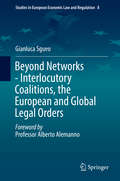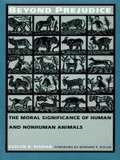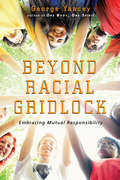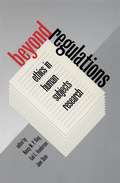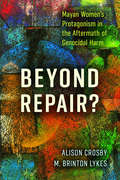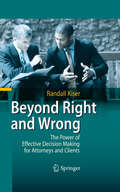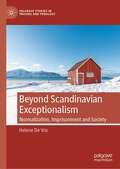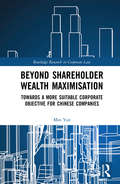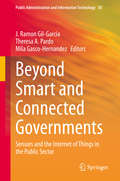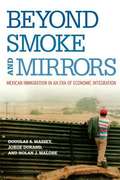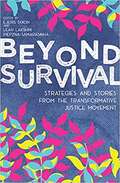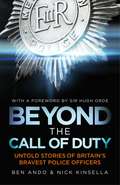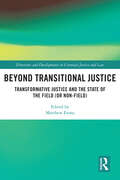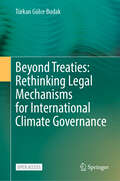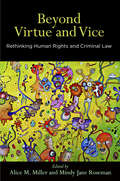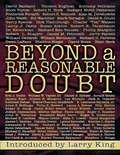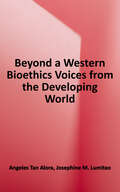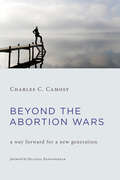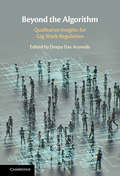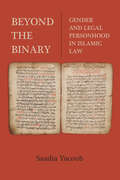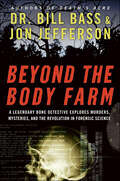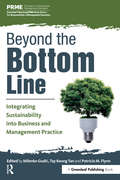- Table View
- List View
Beyond Networks - Interlocutory Coalitions, the European and Global Legal Orders (Studies in European Economic Law and Regulation #8)
by Gianluca SgueoThisbook explores the activism promoted by organised networks of civil society actorsin opening up possibilities for more democratic supranational governance. Itexamines the positive and negative impact that such networks of civil societyactors - named "interlocutory coalitions" - may have on the convergence ofprinciples of administrative governance across the European legal system andother supranational legal systems. Thebook takes two main controversial aspects into account: the first relates tothe convergence between administrative rules pertaining to differentsupranational regulatory systems. Traditionally, the spread of methods ofadministrative governance has been depicted primarily against the background ofthe interactions between the domestic and the supranational arena, both from atop-down and bottom-up perspective. However, the exploration of interactionsoccurring at the supranational level between legal regimes is still notgrounded on adequate empirical evidence. The second controversial aspectconsidered in this book consists of the role of civil society actors operatingat the supranational level. In its discussion of the first aspect, the bookfocuses on the relations between the European administrative law and theadministrative principles of law pertaining to other supranational regulatoryregimes and regulators, including the World Bank, the International MonetaryFund, the World Trade Organization, the United Nations, the Organization forEconomic Cooperation and Development, the Asian Development Bank, and theCouncil of Europe. The examination of the second aspect involves theexploration of the still little examined, but crucial, role of civil societyorganised networks in shaping global administrative law. These "interlocutorycoalitions" include NGOs, think tanks, foundations, universities, andoccasionally activists with no formal connections to civil society organisations. The book describes such interlocutory coalitions as drivers of harmonizedprinciples of participatory democracy at the European and global levels. However, interlocutory coalitions show a number of tensions (e. g. thegovernability of coalitions, the competition among them) that may hamper the impactthey have on the reconfiguration of individuals' rights, entitlements andresponsibilities in the global arena.
Beyond Prejudice: The Moral Significance of Human and Nonhuman Animals
by Evelyn B. PluharIn Beyond Prejudice, Evelyn B. Pluhar defends the view that any sentient conative being--one capable of caring about what happens to him or herself--is morally significant, a view that supports the moral status and rights of many nonhuman animals. Confronting traditional and contemporary philosophical arguments, she offers in clear and accessible fashion a thorough examination of theories of moral significance while decisively demonstrating the flaws in the arguments of those who would avoid attributing moral rights to nonhumans.Exposing the traditional view--which restricts the moral realm to autonomous, fully fledged "persons"--as having horrific implications for the treatment of many humans, Pluhar goes on to argue positively that sentient individuals of any species are no less morally significant than the most automomous human. Her position provides the ultimate justification that is missing from previous defenses of the moral status of nonhuman animals. In the process of advancing her position, Pluhar discusses the implications of determining moral significance for children and "abnormal" humans as well as its relevance to population policies, the raising of animals for food or product testing, decisions on hunting and euthanasia, and the treatment of companion animals. In addition, the author scrutinizes recent assertions by environmental ethicists that all living things or that natural objects and ecosystems be considered highly morally significant. This powerful book of moral theory challenges all defenders of the moral status quo--which decrees that animals decidedly do not count--to reevaluate their convictions.
Beyond Race, Sex, and Sexual Orientation
by Sonu BediThe conventional interpretation of equality under the law singles out certain groups or classes for constitutional protection: women, racial minorities, and gays and lesbians. The United States Supreme Court calls these groups 'suspect classes'. Laws that discriminate against them are generally unconstitutional. While this is a familiar account of equal protection jurisprudence, this book argues that this approach suffers from hitherto unnoticed normative and political problems. The book elucidates a competing, extant interpretation of equal protection jurisprudence that avoids these problems. The interpretation is not concerned with suspect classes but rather with the kinds of reasons that are already inadmissible as a matter of constitutional law. This alternative approach treats the equal protection clause like any other limit on governmental power, thus allowing the Court to invalidate equality-infringing laws and policies by focusing on their justification rather than the identity group they discriminate against.
Beyond Racial Gridlock: Embracing Mutual Responsibility
by George YanceyChristians have struggled with racial issues for centuries, and often inadvertently contribute to the problem. Many proposed solutions have been helpful, but these only take us so far. Adding to this complex situation is the reality that Christians of different races see the issues differently. Sociologist George Yancey surveys a range of approaches to racial healing that Christians have used and offers a new model for moving forward. The first part of the book analyzes four secular models regarding race used by Christians (colorblindness, Anglo-conformity, multiculturalism and white responsibility) and shows how each has its own advantages and limitations. Part two offers a new "mutual responsibility" model, which acknowledges that both majority and minority cultures have their own challenges, tendencies, and sins to repent of, and that people of different races approach racial reconciliation and justice in differing but complementary ways. Yancey's vision offers hope that people of all races can walk together on a shared path--not as adversaries, but as partners.
Beyond Regulations
by Gail E. Henderson Nancy M. King Jane SteinAcross a broad range of disciplines--in medicine, social science, and the humanities--researchers, scholars, teachers, and administrators increasingly are looking for new ways to approach ethical issues in research with human subjects. Questions about how relationships between funders and researchers should affect research design, for example, or whether the potential benefits of research can outweigh the importance of its subjects' interests are inadequately addressed by the prevailing, regulation-based research ethics paradigm. This book constitutes a reexamination of research ethics. It combines case studies and commentaries by a multidisciplinary group of scholars and researchers to explore such topics as informed consent, conflict of interest, confidentiality, and research on illegal behavior. All human subjects research takes place within complex social, cultural, and political contexts, the contributors argue. Increased consideration of the relationships between researchers and their subjects, funders, and institutions within these contexts will facilitate research that is sensitive and responsible as well as scientifically fruitful.Beyond Regulations features a keynote essay by Ruth Macklin. Other contributors are Marcela Aracena Alvarez, Jorge Balan, B. Susan Bauer, Alan F. Benjamin, Lynn Blanchard, Allan M. Brandt, J. Pat Browder, Barbara Entwisle, Sue E. Estroff, Renee C. Fox, Lara Freidenfelds, Gail E. Henderson, Nancy M. P. King, Loretta M. Kopelman, Ernest N. Kraybill, Barry M. Popkin, Silvina Ramos, Desmond K. Runyan, Jane Stein, Ronald P. Strauss, Keith A. Wailoo, and Cynthia Waszak.Across a broad range of disciplines--in biomedicine, the social sciences, and the humanities--researchers, scholars, administrators, and teachers increasingly struggle with questions of ethics in research with human subjects. All research takes place in complex social, cultural, political, and economic contexts; yet the prevailing principle-based research ethics paradigm does not adequately account for them. This book reexamines research ethics using a new relationships paradigm. Through in-depth cases, commentaries, and essays, a multidisciplinary group of scholars and researchers addresses informed consent, conflict of interest, confidentiality, and other issues, considering questions like: What relationships should researchers have with their subjects' communities? When researchers and subjects have different views about research, who should have control? How should relationships between funders and researchers affect research design? Can research be so potentially beneficial that its importance outweighs the interests of subjects? Examining the relationships between researchers and subjects, communities, funders, and institutions--including considerations of authority and voice--can facilitate human subjects research that is morally sensitive and responsible as well as scientifically fruitful.
Beyond Repair?: Mayan Women’s Protagonism in the Aftermath of Genocidal Harm (Genocide, Political Violence, Human Righ)
by M. Brinton Lykes Alison CrosbyBeyond Repair? explores Mayan women’s agency in the search for redress for harm suffered during the genocidal violence perpetrated by the Guatemalan state in the early 1980s at the height of the thirty-six-year armed conflict. The book draws on eight years of feminist participatory action research conducted with fifty-four Q’eqchi’, Kaqchikel, Chuj, and Mam women who are seeking truth, justice, and reparation for the violence they experienced during the war, and the women’s rights activists, lawyers, psychologists, Mayan rights activists, and researchers who have accompanied them as intermediaries for over a decade. Alison Crosby and M. Brinton Lykes use the concept of “protagonism” to deconstruct dominant psychological discursive constructions of women as “victims,” “survivors,” “selves,” “individuals,” and/or “subjects.” They argue that at different moments Mayan women have been actively engaged as protagonists in constructivist and discursive performances through which they have narrated new, mobile meanings of “Mayan woman,” repositioning themselves at the interstices of multiple communities and in their pursuit of redress for harm suffered.
Beyond Right and Wrong: The Power of Effective Decision Making for Attorneys and Clients
by Randall KiserThis book guides attorneys and clients through legal decision making. It analyzes 11,306 attorney-client decisions in actual cases and summarizes decades of research regarding judge, jury, litigant and attorney decision making. To explain why many litigation outcomes are suboptimal, the book describes the psychological and institutional factors that impede sound decision making. The roles of attorneys and clients in legal decision making and the legal malpractice and disciplinary consequences of ineffective legal representation also are discussed. To rapidly promote better financial outcomes in civil litigation and to assist attorneys and clients in becoming expert decision makers, the book presents more than 65 ideas, methods and systems for improving personal and group decision making.
Beyond Scandinavian Exceptionalism: Normalization, Imprisonment and Society (Palgrave Studies in Prisons and Penology)
by Helene De VosThis book explores how prison life is normalized in different countries, with a critical and detailed look at ‘Scandinavian exceptionalism’ — the idea that Scandinavian prisons have exceptionally humane conditions — and compares these prisons to ones in Belgium. It provides a more nuanced, systematic and contextualized comparison of normalization in two countries. Through analyzing policy and legislative documents, participant observation and interviews, it seeks to understand how normalization is implemented differently in prison legislation, policies and practices and compares the two societies for context. It also considers the material prison environment, security, the social environment and the use of time in prison. It provides insights into how normalization can be successfully and holistically implemented in both policy and practice, to contribute to a more ‘pure’ form of liberty deprivation as punishment without too many unintended effects.
Beyond Shareholder Wealth Maximisation: Towards a More Suitable Corporate Objective for Chinese Companies (Routledge Research in Corporate Law)
by Min YanThe corporate objective, namely, in whose interests a company should be run, is the most important theoretical and practical issue confronting us today, as this core objective animates or should animate every decision a company makes. Despite decades of debate, however, there is no consensus regarding what the corporate objective is or ought to be, but clarity on this issue is necessary in order to explain and guide corporate behaviour, as different objectives could lead to different analyses and solutions to the same corporate governance problem. In addition to the study on the corporate objective in Anglo-American jurisdictions, the discussion of this topic in the context of China is also very important on the grounds that China has become the second largest economy in the world and is playing an increasingly significant role in global affairs. Though a socialist state, China has also been relying heavily on the corporate vehicle as the most important business organisational form to ensure its rapid economic development since its market reforms in 1978. Adolf Berle and Gardiner Means’s observation made over eight decades ago that large public companies dominate the world remains true today, not only in the West but also in China. The regulation and governance of such companies will have a material impact on the further development of the Chinese economy, which could in turn directly affect the world economy. Company law and corporate governance therefore receive much attention and have become a vital issue in China. Although the current focus is primarily on corporate performance, the fundamental question at the heart of corporate governance, namely the corporate objective, is still unresolved. Contrary to the widely held belief that the corporate objective should be maximising shareholder wealth, this book seeks to demonstrate that the shareholder wealth maximisation approach is both descriptively inaccurate and normatively unsuitable. As an antithesis to it, stakeholder theory generally develops to be a more suitable substitute. Justifications and responses to its main criticisms are offered from descriptive, normative and instrumental aspects, whilst new techniques of balancing competing interests and more workable guidance for directors’ behaviour are brought forward as essential modifications. Along with the unique characteristics of socialist states, the stakeholder model is expected to find solid ground in China and guide the future development of corporate governance. This book will be important and useful to researchers and students of corporate law, corporate governance, business and management studies.
Beyond Smart and Connected Governments: Sensors and the Internet of Things in the Public Sector (Public Administration and Information Technology #30)
by J. Ramon Gil-Garcia Theresa A. Pardo Mila Gasco-HernandezThis book provides a comprehensive introduction to the study of sensors and the Internet of Things (IoT) from a government and public policy perspective. Since 2011, federal spending on IoT has been growing at a compound annual rate of ten percent. New technologies, such as sensors, and new kinds of data, such as big data, are creating new ways to systematically capture data and to use it to respond to complex problems. Some of these new technologies and applications have been identified and studied in recent literature in terms of their relevance to government. This volume adds to the literature by presenting sound theories and concepts for understanding the opportunities and challenges governments face when seeking to improve public services and government operations through the use of IoT. It also includes innovative methodologies for building understanding of the potential of a smart and connected government. In addition, the book offers relevant case studies and practical recommendations for the development, management, and evaluation of public policies and government programs.
Beyond Smoke and Mirrors: Mexican Immigration in an Era of Economic Integration
by Douglas Massey Jorge Durand Nolan J. MaloneIn a very real way, the Mexico-U.S. migration system functioned as a complicated piece of machinery in the years from 1965 through 1986. It was composed of a set of delicately balanced social and economic processes that had emerged gradually over many years in response to specific changes in the political economies of Mexico and the United States. Cross-border population movements had a characteristic form, and over time they acquired a relatively stable structure and a well- defined geographic organization. Migration between Mexico and the United States followed predictable paths in accordance with well-established scientific principles. Just as it is not advisable to take a wrench to a precision clock if one is not a qualified clockmaker, it is not wise to pull policy levers if one has no real conception of how the underlying system functions. Yet this is exactly what happened beginning in 1986, when the U.S. Congress and successive presidents presided over a series of legislative and bureaucratic changes that fundamentally changed the rules under which the Mexico-U.S. migration system operated.
Beyond Survival: Strategies And Stories From The Transformative Justice Movement
by Leah Lakshmi Piepzna-Samarasinha Ejeris DixonTransformative justice seeks to solve the problem of violence at the grassroots level, without relying on punishment, incarceration, or policing. Community-based approaches to preventing crime and repairing its damage have existed for centuries. However, in the punative atmosphere of contemporary criminal justice systems, they are often marginalized and operate under the radar. Beyond Survival puts these strategies front and center as real alternatives to today’s failed models of confinement and “correction.” In this collection, a diverse group of authors focuses on concrete and practical forms of redress and accountability, assessing existing practices and marking paths forward. They use a variety of forms—from toolkits to personal essays—to delve deeply into the “how to” of transformative justice, providing alternatives to calling the police, ways to support people having mental health crises, stories of community-based murder investigations, and much more. At the same time, they document the history of this radical movement, creating space for long-time organizers to reflect on victories, struggles, mistakes, and transformations.
Beyond The Call Of Duty: Untold Stories of Britain's Bravest Police Officers
by Ben Ando Nick KinsellaThe book used by Thandie Newton to research her part in Line of Duty. A lone policewoman disarms a knife-wielding schizophrenic; two officers drag a woman from a railway line seconds before an express train roars past; an undercover cop clings onto the bonnet of a drug-dealer's car as it speeds through a busy town centre. These are just some of the ways Britain's police officers are daily called upon to demonstrate bravery in the line of duty when even the most routine call can turn into a life-or-death situation and split-second judgements can make all the difference. Sometimes officers make the ultimate sacrifice in fulfilling their duty. When PC Bill Parker was swept to his death by floodwaters in Cumbria in 2009, he had been working to save stranded motorists from the same fate.This thrilling collection of first-person accounts of true courage celebrates the sustained bravery and presence of mind routinely displayed by so many officers in England, Wales and Scotland. The stories also reveal an insider's view of the culture, training and techniques police officers use in carrying out their duties.
Beyond This Place
by A. J. CroninThis is the story of a son and his father, a crime of passion and a crime of injustice.
Beyond Transcendence in Law and Philosophy (Birkbeck Law Press Ser.)
by Louis E. WolcherWhat is the law of the law? What produces our craven subservience to linguistic norms, and our shocking indifference to the phenomenon of universal suffering? In a path-breaking new work of philosophy, Louis Wolcher seeks to answer these questions from the standpoint of Zen Buddhism.Bringing an Eastern sensibility into contact with three of the most important themes in Western philosophy, Beyond Transcendence in Law and Philosophy meticulously investigates three of the twentieth century's most important philosophers: Martin Heidegger - on being, Emmanuel Levinas - on ethics, and Ludwig Wittgenstein - on language. In the context of the larger Western obsession with transcending the ordinary, Louis Wolcher argues that the yearning for transcendence is born of the illusion that there is a fundamental difference between the ordinary and the profound. Employing Zen koans and stories to advance a 'deflationary' view of language and knowledge, he goes on to argue that the norms of transcendence to which we cling are not eternal truths but artefacts of desperate minds adrift on a sea of impermanence. What used to seem so majestically True, Right and Just thus shows itself to be utterly mundane: as merely true, right and just. What is left, however, is not nihilism - for clinging to a view of 'nothingness' is just as deluded as clinging to a view of 'somethingness' - but rather a new beginning of compassionate concern for the suffering of others. Beyond Transcendence in Law and Philosophy is a strikingly original synthesis of Eastern and Western thought. It will enlighten philosophers and legal theorists, as well as those who are interested in or open to the insights of Zen Buddhism.
Beyond Transitional Justice: Transformative Justice and the State of the Field (or non-field)
by Matthew EvansBeyond Transitional Justice reflects upon the state of the field (or non-field) of transitional justice in the current conjuncture, as well as identifying new possibilities and challenges in the fields with which transitional justice overlaps (such as human rights, peacebuilding, and development). Chapters intervene at the cutting edge of contemporary transitional justice research, addressing key theoretical and empirical questions and covering critical, international, interdisciplinary, theoretical, and practice-oriented content. In particular, the notion of transformative justice is discussed in light of the emerging scholarship defining and applying this concept as either an approach within or an alternative to transitional justice. The book considers the extent to which transformative justice as a concept adds value to scholarship on transitional justice and related areas and asks what the future might hold for this area as a field – or non-field. A timely intervention, Beyond Transitional Justice is ideal reading for scholars and students in the fields of human rights, peace and conflict studies, international law, critical legal theory, development studies, criminology, and victimology.
Beyond Treaties: Rethinking Legal Mechanisms for International Climate Governance
by Türkan Gülce BudakThis open access book examines the implications of the shift towards minilateralism for international climate law, analysing how climate-related trade measures and Paris Agreement compatible platforms may enhance global climate governance. The landscape of international climate change law is evolving from a traditional consensus-based treaty model, characterized by comprehensive yet often slow-moving agreements, toward a more pragmatic approach known as minilateralism. In this emerging paradigm, smaller groups of countries negotiate and implement trade measures aimed at mitigating climate impacts. An exemplary case is the European Green Deal, which introduces climate-related trade measures as a key instrument for achieving sustainability goals within and beyond Europe. Additionally, countries are exploring minilateral cooperation platforms within the Paris Agreement framework to further their climate objectives. The central questions to be addressed in this book are twofold. First, how can the design of the minilateral schemes comply with the Paris Agreement&’s international cooperation, common but differentiated responsibilities and respective capacities, and market-based mechanisms principles? Second, to what extent does the climate-related trade measures conform with the WTO regime, particularly with the non-discrimination principles of the trade law, namely most favoured nation and national treatment?
Beyond Virtue and Vice: Rethinking Human Rights and Criminal Law (Pennsylvania Studies in Human Rights)
by Alice Miller Mindy RosemanOver the past two decades, human rights as legal doctrine and practice has shifted its engagement with criminal law from a near exclusive condemnation of it as a source of harm toward increasingly invoking it as a necessary remedy for abuses. These shifts are most visible in the context of sexuality, reproduction, and gender. <P><P>Criminal law appears in modern states as a tool for societies to define forbidden acts (crimes) and prescribe punishments. It authorizes the state to use force as an aspect of expressing and establishing norms—societal expectations for acceptable behavior which when breached permit individuals to be excluded and stigmatized as unfit for inclusion. <P><P> But the core principles of human rights oppose exclusion and stigma and embrace the equality and dignity of all. Therefore there is an insuperable tension when human rights actors invoke criminal law to protect and vindicate human rights violations.Beyond Virtue and Vice examines the ways in which recourse to the criminal law features in work by human rights advocates regarding sexuality, gender, and reproduction and presents a framework for considering if, when, and under what conditions, recourse to criminal law is compatible with human rights. <P><P>Contributors from a wide range of disciplinary fields and geographic locations offer historical and contemporary perspectives, doctrinal cautionary tales, and close readings of advocacy campaigns on the use of criminal law in cases involving abortion and reproductive rights, HIV/AIDS, sex work and prostitution law, human trafficking, sexual violence across genders, child rights and adolescent sexuality, and LGBT issues. <P><P>The volume offers specific values and approaches of possible use to advocates, activists, policy makers, legislators, scholars, and students in their efforts to craft dialogue and engagement to move beyond state practices that compromise human rights in the name of restraining vice and extolling virtue. <P><P>Contributors: Aziza Ahmed, Widney Brown, Sealing Cheng, Sonia Corrêa, Joanna N. Erdman, Janet Halley, Alli Jernow, Maria Lucia Karam, Ae-Ryung Kim, Scott Long, Vrinda Marwah, Alice M. Miller, Geetanijali Misra, Rasha Moumneh, Wanja Muguongo, Oliver Phillips, Zain Rizvi, Mindy Jane Roseman, Esteban Restrepo Saldarriaga, Tara Zivkovic.
Beyond a Reasonable Doubt
by Larry King“ Beyond a reasonable doubt” is heard countless times every day in courtrooms around the country. And yet the standard represented by this phrase is nowhere mentioned in the constitution. Nor is it defined anywhere in our laws. What, then, does it really mean? How can it be interpreted? In Beyond a Reasonable Doubt, more than 80 influential scholars, attorneys, novelists, journalists, and religious figures— including Vice President Kamala Harris— discuss, explore, interpret, and define the phrase and its meaning. Featuring contributions from David Baldacci, Vincent Bugliosi, Frederick Forsyth, Jack Kevorkian, Robert Shapiro, and Scott Turow, among others, this collection of essays, Beyond a Reasonable Doubt— edited and introduced by Larry King— is essential reading for anyone with an interest in how our justice system works today and how it will work in the future.
Beyond a Western Bioethics: Voices from the Developing World (Clinical Medical Ethics Ser.)
by Angeles Tan Alora Josephine M. LumitaoIn this book, physicians Angeles Tan Alora and Josephine M. Lumitao join eight other contributors to provide a comprehensive exploration of bioethical issues outside of the dominant American and western European model. Using the Philippines as a case study, they address how a developing country's economy, religion, and culture affect the bioethical landscape for doctors, patients, families, and the society as a whole. American principles of medical ethics assume the primacy of individual autonomy, the importance of truth-telling, and secular standards of justice and morality. In the Philippines, these standards are often at odds with a culture in which family relationships take precedence over individualism, and ideas of community, friendship, and religion can deeply influence personal behavior. Pervasive poverty further complicates the equation. Contributors move from a general discussion of the moral vision informing health care decisions in the Philippines to an exploration of a wide range of specific cases: family planning, care of the elderly, organ transplants, death and dying, medical research, AIDS care, doctor-patient relationships, informed consent, and the allocation of scarce health-care resources. Written for both students and professionals, the book provides a much-needed perspective on how medical ethics are practiced in a developing nation, and it successfully challenges the wisdom of global bioethical standards that do not account for local cultural and economic differences.
Beyond the Abortion Wars: A Way Forward for a New Generation
by Charles C. CamosyCuts through the mass confusion surrounding abortion and lays out solid common ground The abortion debate in the United States is confused. Ratings-driven media coverage highlights extreme views and creates the illusion that we are stuck in a hopeless stalemate. In this book Charles Camosy argues that our polarized public discourse hides the fact that most Americans actually agree on the major issues at stake in abortion morality and law. Unpacking the complexity of the abortion issue, Camosy shows that placing oneself on either side of the typical polarizations -- pro-life vs. pro-choice, liberal vs. conservative, Democrat vs. Republican -- only serves to further confuse the debate and limits our ability to have fruitful dialogue. Camosy then proposes a new public policy that he believes is consistent with the beliefs of the broad majority of Americans and supported by the best ideas and arguments about abortion from both secular and religious sources.
Beyond the Algorithm: Qualitative Insights for Gig Work Regulation
by Deepa Das AcevedoIn Beyond the Algorithm: Qualitative Insights for Gig Work Regulation, Deepa Das Acevedo and a collection of scholars and experts show why government actors must go beyond mass surveys and data-scrubbing in order to truly understand the realities of gig work. The contributors draw on qualitative empirical research to reveal the narratives and real-life experiences that define gig work, and they connect these insights to policy debates being fought out in courts, town halls, and even in Congress itself. The book also bridges academic and non-academic worlds by drawing on the experiences of drivers, journalists, and workers' advocates who were among the first people to study gig work from the bottom up. This book is a must-read for anyone interested in gig work, the legal infrastructure surrounding it, and how that infrastructure can and must be improved.
Beyond the Binary: Gender and Legal Personhood in Islamic Law
by Saadia YacoobA free ebook version of this title is available through Luminos, University of California Press's Open Access publishing program. Visit www.luminosoa.org to learn more. One of the most hotly debated issues in contemporary Muslim ethics is the status of women in Islamic law. Whereas Muslim conservatives argue that gender-differentiated legal rulings reflect complementary gender roles, Muslim feminists argue that Islamic law has subordinated women and is thus in need of reform. The shared assumption on both sides, however, is that gender fundamentally shapes an individual’s legal status. Beyond the Binary explores an expansive cross section of topics in ninth- to twelfth-century Hanafi legal thought, ranging from sexual crimes to consent to marriage, to show that early Muslim jurists imagined a world built not on a binary distinction between male and female but on multiple intersecting hierarchies of gender, age, enslavement, lineage, class, and other social roles. Saadia Yacoob offers a restorative reading of Islamic law, arguing that its intersectional and relational understanding of legal personhood offers a productive space for Muslim feminists to move beyond critique and instead think with and through the Islamic legal tradition.
Beyond the Body Farm: A Legendary Bone Detective Explores Murders, Mysteries, and the Revolution in Forensic Science
by Bill Bass Jon JeffersonAn “excellent” collection of case studies and stories from the forensic anthropologist who founded Tennessee’s “Body Farm” (Charleston Post & Courier).A pioneer in forensic anthropology, Bill Bass created the world’s first laboratory dedicated to the study of human decomposition—three acres on a Tennessee hillside where human bodies are left to the elements. His research at the Body Farm has revolutionized the field, helping crack cold cases and pinpoint time of death. But during a forensics career that spans half a century, Bass’s work has ranged far beyond the gates of the Body Farm. In this riveting book, the bone sleuth explores the rise of modern forensic science, using fascinating cases he’s worked on to take readers into the real world of C.S.I.Some cases rely on the simplest of tools and techniques, such as reassembling—from battered torsos and a stack of severed limbs—eleven people hurled skyward by an explosion at an illegal fireworks factory. Other cases hinge on sophisticated techniques Bass couldn’t have imagined when he began his career: harnessing scanning electron microscopy to detect trace elements in knife wounds, or extracting DNA from a long-buried corpse, only to find that the murder victim may have been mistakenly identified a quarter-century before.Beyond the Body Farm follows Bass as he explores the depths of a lake with a twenty-first-century sonar system in search of an airplane that vanished thirty-five years ago; exhumes a fifties pop star to determine what injuries he suffered in the plane crash that killed three rock and roll legends; and works to decipher an ancient Persian death scene. Witty and engaging, Bass dissects the methods used by homicide investigators every day on an extraordinary journey into the high-tech science that it takes to crack a case.“Case studies and anecdotes from the field of corpse identification [with] careful attention to detail and the occasional darkly humorous aside.” —Publishers Weekly“The real crimes and mysteries here are just as or more intriguing than any fictional crime drama . . . offers a real-life understanding of forensic anthropology and the science behind it.” —Knoxville News-Sentinel
Beyond the Bottom Line: Integrating Sustainability into Business and Management Practice
by Patricia M. Flynn Tay Keong Tan Milenko GudićBeyond the Bottom Line: Integrating the UN Global Compact into Management Practice is the first book to look at how the Ten UN Global Compact Principles and the sustainability agenda can be incorporated into business practice. The UN Global Compact is the largest corporate sustainability initiative and, with over 12,000 participating organizations, provides a major influence on global business sustainability practices. Its mission is to guide organizations in how to (1) do business responsibly by aligning their strategies and operations with Ten Principles on human rights, labour, environment and anti-corruption; and (2) take strategic actions to advance broader societal goals, such as the UN Sustainable Development Goals, with an emphasis on collaboration and innovation.This new book addresses head-on some of the most persistent managerial challenges faced by businesses and organizations today. To what extent are businesses able to practice responsible management with regard to the Ten Principles of the UN Global Compact? How can managers of organizations comprehensively and pragmatically address the risks and responsibilities concerning these complex and changing issues in their policies and practice? It also offers a platform for academics to confront some of the most intriguing intellectual challenges on this topic.
